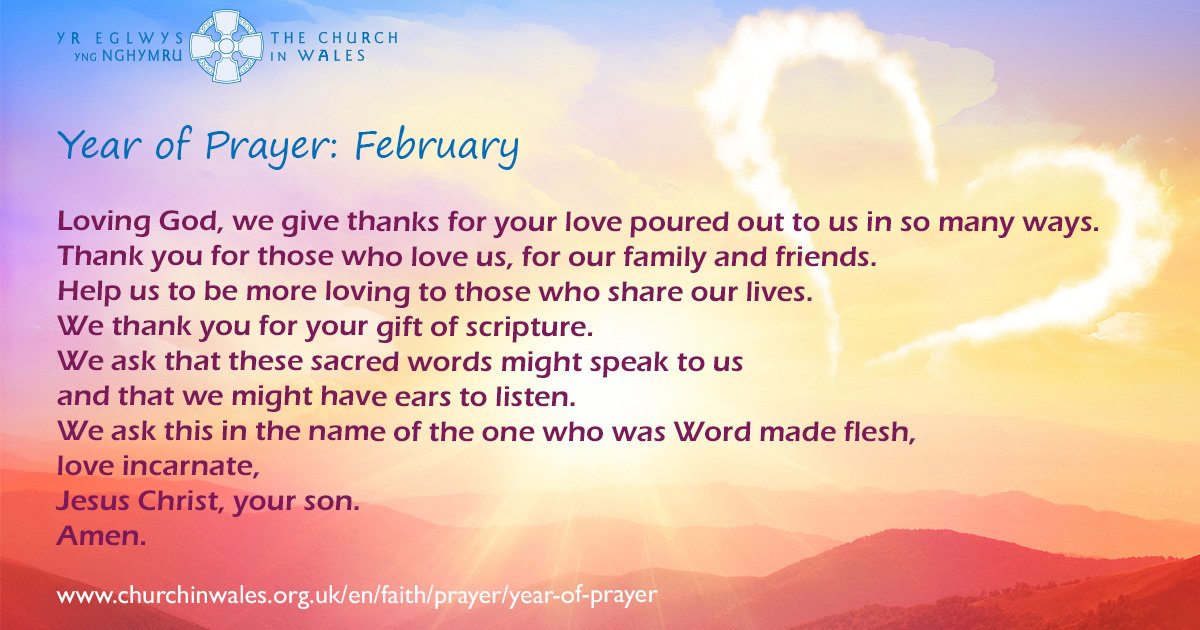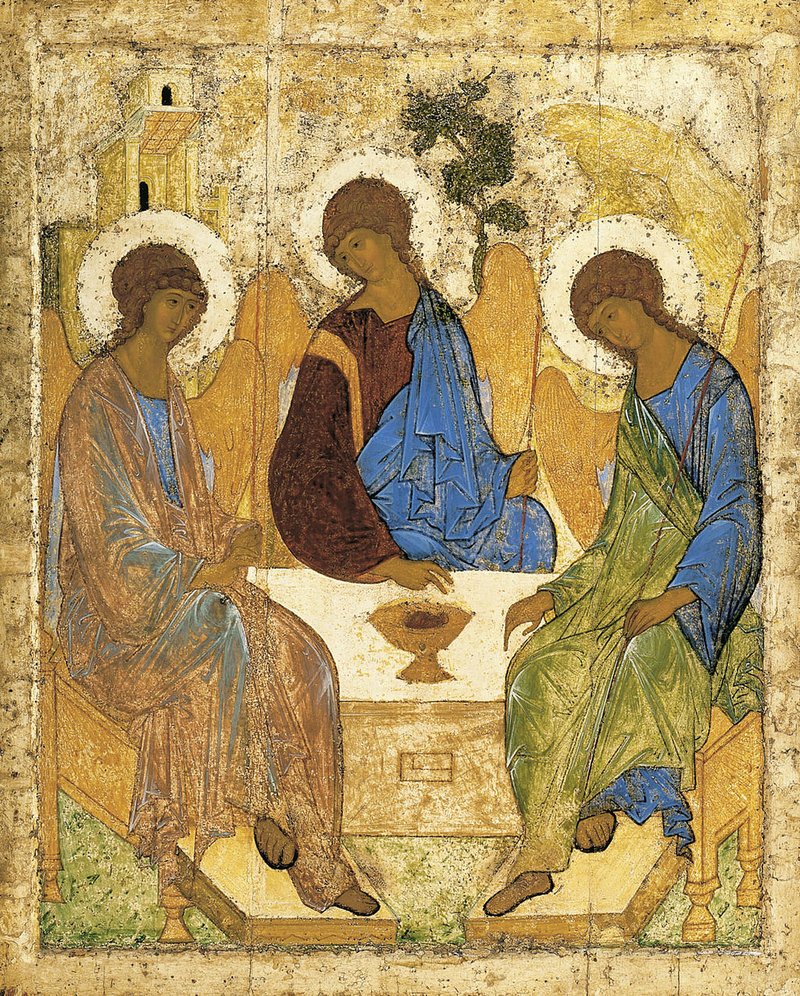February 2023 - LOVE
Welcome to the February Prayer, and the sixth in a series of 12. Each month we will explore different themes and different ways of praying which we hope you will find helpful as ways in which to encounter God. The Provincial Spirituality Group in the Church in Wales.
Introduction
The theme for this month is LOVE - a simple, four-letter word – and so we will be exploring some of aspects of love this month. Our prayer this month is ‘lectio divina’ meaning ‘divine or holy reading’. It is an invitation to a slow, reflective, personal reading of scripture. More about how to pray in this way can be explored below.
The word love can have a very different meaning for each one of us:
- What comes to mind when you hear the word love?
- What is love for you?
- Whom do you love?
- What do you love?
- Have you considered that God loves you?
You might find it helpful to jot down your thoughts and ideas if you want to reflect or pray with them at a later time.
The Bible mentions at least four different kinds of love:
- God’s unconditional love (agape)
- Friendship (philia)
- Romantic love (eros)
- Family love (storge).
Love includes every aspect of our life in Christ.

Reflection
February is traditionally associated with romantic love – we remember the life and witness of St Valentine. According to legend, he was a Roman priest, martyred for his faith in the early days of the church because he had secretly married Christian couples. In another legend, he signed his letter to a friend “from your Valentine”, which may be the origin of the cards we send today. We may never know the full details of St Valentine’s story but we remember him for his faithful witness to the gospel at a time when Christians were undergoing brutal persecution for their faith. This may lead us to pray for Christians today who are experiencing the same fate (the additional resources offer some suggestions).
In Wales, St Dwynwen, 5th Century, is the patron saint for love and friendship. Although her feast day is celebrated on 25th January, we can also remember her now. She was the daughter of a Welsh King and unable to marry the man she loved. Dwynwen prayed to God and with her prayers answered set up a convent on Llanddwyn island (off the coast of Anglesey) where she spent her life in prayer for all, especially those with difficulties in their love life. The ruins of her church can still be seen, and tradition says that one of her favourite sayings was: “Nothing wins hearts like cheerfulnes''.
Prayer of the Month: Lectio Divina
A Prayerful Reading of Scripture.
This ancient form of prayer, sometimes called ‘Lectio Divina’ or ‘divine reading’, is a way to hear God speak to you personally through reflection on a short passage of scripture. You could use one of the Bible passages included here and there are a few other suggestions included below - but do not worry too much about your selection – God will find a way to speak to you, whichever passage you choose.
Bible Passages
Two bible passages from the New Testament are offered to be read slowly. As you do consider what they say to you about love.
The first is from the Letter to the Romans, Chapter 8. 31-39 and speaks of God’s love as seen in Christ Jesus.
What then are we to say about these things? If God is for us, who is against us? He who did not withhold his own Son, but gave him up for all of us, will he not with him also give us everything else?
Who will bring any charge against God’s elect? It is God who justifies. Who is to condemn? It is Christ Jesus, who died, yes, who was raised, who is at the right hand of God, who indeed intercedes for us. Who will separate us from the love of Christ? Will hardship, or distress, or persecution, or famine, or nakedness, or peril, or sword?
As it is written: ‘For your sake we are being killed all day long; we are accounted as sheep to be slaughtered.’ No, in all these things we are more than conquerors through him who loved us.
For I am convinced that neither death, nor life, nor angels, nor rulers, nor things present, nor things to come, nor powers, nor height, nor depth, nor anything else in all creation, will be able to separate us from the love of God in Christ Jesus our Lord.
The second passage is from the First Letter of John, Chapter 4. 7-10, 16a-21 and tell us that God Is love.
Beloved, let us love one another, because love is from God; everyone who loves is born of God and knows God. Whoever does not love does not know God, for God is love.
God’s love was revealed among us in this way: God sent his only Son into the world so that we might live through him. In this is love, not that we loved God but that he loved us and sent his Son to be the atoning sacrifice for our sins.
God is love, and those who abide in love abide in God, and God abides in them. Love has been perfected among us in this: that we may have boldness on the day of judgement, because as he is, so are we in this world.
There is no fear in love, but perfect love casts out fear; for fear has to do with punishment, and whoever fears has not reached perfection in love. We love because he first loved us. Those who say, ‘I love God’, and hate their brothers or sisters, are liars; for those who do not love a brother or sister whom they have seen, cannot love God whom they have not seen. The commandment we have from him is this: those who love God must love their brothers and sisters also.
A Prayerful Reading of Scripture
Further Suggestions and Resources
Poems
Love (III) (George Herbert , 1593-1633)
Let Your God Love You (Edwina Gateley, from There Was No Path So I Trod One, 1996)
Music – Listen or Sing
Image
In this image of the Holy Trinity (by Andrei Rublev, 15th century):
we are invited to sit down at the table – the space immediately in front of us is left vacant. This welcome is reflected in a line from Herbert’s poem above.

“You must sit down, says Love, and taste my meat: So I did sit and eat”.
https://commons.wikimedia.org/wiki/File:Angelsatmamre-trinity-rublev-1410.jpg
Andrei Rublev, Public domain, via Wikimedia Commons
Videos
To find out more about St Dwynwen go to a signed (BSL) lighthearted video:
An explanation about the meaning of the word LOVE (ahavah) in the bible:
https://bibleproject.com/explore/video/ahavah-love/
Prayer for Persecuted Christians
Go to https://www.opendoorsuk.org/persecution/ for information about the work of Open Doors and explore https://www.opendoorsuk.org/resources/prayer for further prayer resources.
Next Month
We hope that you have found these reflections and prayers helpful, and they may of course need thinking about and praying more than once. Next month our theme will be looking at what mean by ‘family’ and the prayers looking at a personal word or phrase to use when praying.